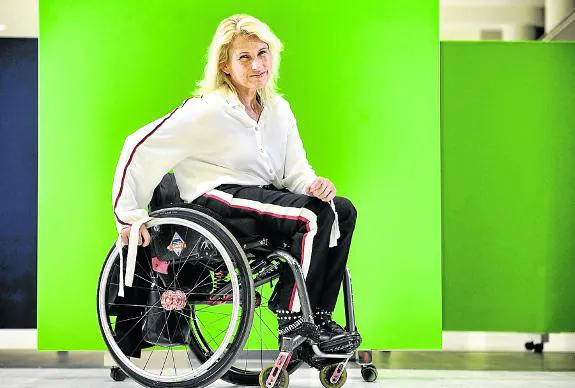'It's hard to learn to be calm: if the body doesn't move, the mind flies around'
She already knows that sport is a battle. She learned that early in life, and continues to overcome challenges. The latest: to go up Kilimanjaro in her wheelchair
ANA PÉREZ-BRYAN
Lunes, 17 de agosto 2020, 18:47
A car accident when she was four forced her to learn everything all over again, in a wheelchair, but if anyone thought that was going to inhibit her, they were wrong: on the contrary, Gema Hassen Bey has never stopped.
Not even the year she spent gazing up at the hospital ceiling after a spinal operation deterred her. There, horizontal, she made her plans and now she is reaping the rewards: journalist, actress, composer, paralympic athlete in fencing (five Olympics, three medals) and coach.
Her latest challenge is to climb Kilimanjaro in her adapted chair, so the peak becomes more of a collective legacy than a personal feat. Gema remains that girl with special needs: to live and to improve. Hence the revolution.
Are you a warrior with a sword?
Of course. With a sword and a foil. I believe life gives you big challenges, and in my case, after the car accident, it wasn't easy. Although it also gave me the weapons to fight for my goals. I fence and I don't believe that is coincidental. It is practically a way of life which enables me to achieve my dreams.
What is your armour made of?
It's a combination of fragility and strength, because I believe both of those are necessary. That's how I understand life. My friends say I am a 'killer', but it's not like that. I'm aware of my fragility and that's what makes me strong.
You face a Kilimanjaro every day. Explain that to me.
Many people do, and especially in a wheelchair. It seems incredible that man can go to the moon and we have problems getting out to buy bread.
Now the real thing is coming. How do you feel about it?
Well, once again I am practising resiliance because it is a very difficult challenge. It's not just a case of going up a mountain, but also generating prototypes as an athlete and social entrepreneur. The latter is very complicated because of a paternalism I have to fight against: the people to whom I present the project think that, because I'm in a wheelchair, they are the ones who have to help me. But what I say is that it is a creation of alliances in which we all help each other equally. I want to be part of the process, and make this a legacy for those who come later.
And while you were training you were diagnosed with breast cancer...
Yes. When the doctor told me, I said "OK, OK, but do the operation so I can go up Kilimanjaro." The answer was that for a year I would only have enough strength to think about myself, but within two and a half months I had recovered and they gave me the go-ahead soon after. I treated my convalescence as another peak to climb. And do you know what? I realised that I had already done everything that had passed through my head before.
Talking about mountains, how many times have you opted for the mountain going to Mohammed and not the other way round?
Many times. In fact, with the lockdown we have all been a bit disabled in a way. And I have experienced it as well with my operations: it was hard work to learn to stay calm, to know that if the body can't move the mind flies around.
What does a medal taste like?
I remember the first one, because it was a demonstration that the impossible is possible and that success is being in the competition. It also taught me that athletes have to focus on the path, not the result.
And failure?
It is just as intense. Sometimes I have been the best in the world and at other times the worst, and you learn from both things. In fact, if you were to ask me to choose one object from my five Olympics...
Which would it be?
My sword, without a doubt. The medals have just been a moment on the road, but my sword has always been with me.
Neither olympics nor mountains, but not closets either. Was it hard to open that last door?
I always say I fight so hard because everything is difficult for me: woman, in a wheelchair, with a strange surname (it is of Turkish origin), my sexual orientation... coming out of the closet caused me problems in the last year of fencing. Nobody tells you that you are rejected because of your sexuality, but suddenly I went from being a princess who had to be looked after to an amazon that became a threat. That's why when they asked me to do something against homophobia in sport I decided to take the step and say I was bisexual.
You can climb a mountain but not get onto a float in a Pride parade. That's a bit shocking.
Just a bit! I'm not going to stop until I see an adapted float. Meanwhile, I'll look for a nice-looking girl or boy to help me get on.
